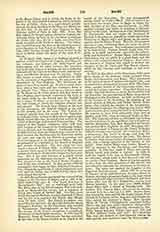

Manta (MAILLAC), JOSEPH-ANNA-MARIE DE MOYRIA DE, Jesuit missionary; b. December 16 1669, at Chateau Maillac on the Isere; d. June 28, 1748, at Peking, China. After finishing his studies he joined the Society of Jesus in 1686, and in 1701 was sent on the mission to China as a member of the order. In June, 1703, he arrived in Morocco and thence set out for Canton, where he acquired a thorough knowledge of the Chinese language and style of writing, and devoted himself particularly to the study of Chinese historical works. When the Emperor Khang-hi entrusted the Jesuit missionaries with the cartographical survey of his empire, the provinces of Ho-nan, Kiang-nan, Tshekiang, and Fo-kien, and the Island of Formosa fell to the lot of Father Mailla along with Fathers Regis and Hinderer. As a mark of his satisfaction, the emperor, when the work had been completed, conferred on Father Mailla the rank of mandarin. When he was fifty years old he began the study of the Manchurian tongue, and made such progress that he was able to translate into French the “Thoung-kian-kang-mou”, an extract from the great Chinese annals, which the emperor had had prepared in the Manchurian language, He finished the translation in several volumes in the year 1730, and in 1737 sent it to France, where it lay for thirty years in the library of the college at Lyons, Ferret, who purposed publishing it, having died. On the suppression of the order the college authorities gave the manuscript to the Abbe Crosier on condition that he would see to the publication of the work, which had long been awaited with interest by the learned world. Not long after, the work appeared under the title: “Histoire generale de la Chine, ou Annales de cet Empire; traduit du Tong-kiere-kang-mou par de Mailla, Paris, 1777-1783″, in 12 volumes, with maps and plans. In 1785 a thirteenth volume followed. Besides Grosier, the Orientalists Deshauterayes and Colson were mainly responsible for the publication. Mailla’s work even to this day provides the most important foundation for any connected presentation of the history of China. Mailla is also the first European scholar to whom we owe a detailed knowledge of the “Shuking”, the classic historical work of the Chinese, most of its books being included in his translation. Mailla, also, in order to promote the work of the mission, compiled some edifying books in Chinese; the most important being lives of the saints, and meditations on the Gospels of the Sundays throughout the whole year. In “Lettres edifiantes” there are some interesting letters from him on the persecution of the Christians which took place in China during his time. When he died, in his seventy-ninth year, he was buried at the expense of the Emperor Khiang-lung, many people being present at the obsequies.
OTTO HARTIG

